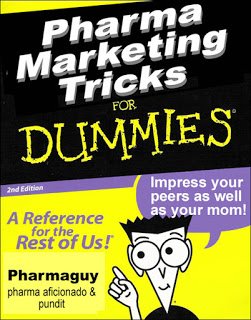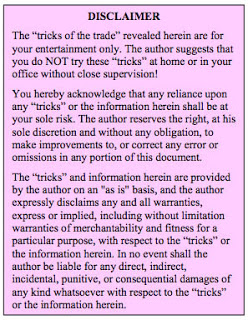 Dennis Urbaniak (@DUrbaniak), VP U.S. Diabetes at sanofi-aventis, winner of the 3rd Annual Pharmaguy Social Media Pioneer Award (see here), tweeted a link to a blog post titled “Avoiding Magic for Magicians, Marketing for Marketers” by Christopher Penn, the author of Marketing White Belt. Clearly, Mr. Penn is outside my limited universe of the pharmaceutical industry, so I thank Dennis for bringing this post to my attention.
Dennis Urbaniak (@DUrbaniak), VP U.S. Diabetes at sanofi-aventis, winner of the 3rd Annual Pharmaguy Social Media Pioneer Award (see here), tweeted a link to a blog post titled “Avoiding Magic for Magicians, Marketing for Marketers” by Christopher Penn, the author of Marketing White Belt. Clearly, Mr. Penn is outside my limited universe of the pharmaceutical industry, so I thank Dennis for bringing this post to my attention.
In his post, Penn says there are two types of magicians: those who perform tricks to impress other magicians and those who perform tricks to entertain an audience of ordinary people.
“If you get trapped inside the magician’s fishbowl,” says Penn, “your magic changes to be more about deceiving other magicians, magicians who already know the majority of the basic tricks. Your tricks get increasingly complicated and complex, and as a result, more entertaining to magicians who understand the different levels of skill needed to perform the tricks. Paradoxically, your tricks get less and less entertaining to the general public, who can’t tell the difference between an Olram subtlety and a monkey shuffling cards.”
Penn relates this to what some marketers, including pharma marketers, may be doing:
“What does this have to do with marketing? The same fishbowl can sneak up on you as a marketer. Read enough marketing blogs or SEO blogs or hang out at enough social media conferences and you risk starting to play marketing magic to other marketers and not the general public. Anyone who’s been around an SEO person who’s had too much Kool-Aid has seen this – their ability to use the English language itself changes when they spend all their time using every trick they’ve found.”
Penn’s advice for overcoming this: “You’ll find that a handful of basic techniques performed flawlessly with great showmanship will win you audiences on the magic stage, and a handful of basic marketing techniques performed flawlessly with great content and stories will win you business.”
Essentially, avoid the hype around the new shiny thing (e.g.. big data, multichannel, segmentation, etc.), and get down to basics: storytelling.
That’s good advice for marketers in general, but maybe not so good advice for pharma marketers, who find it difficult to include brands in their “storytelling” without putting the audience to sleep or scaring them with the required side effect information.
Maybe that’s why many pharma marketers — including Dennis Urbaniak and his diabetes group — prefer to do “unbranded” marketing such as disease awareness campaigns like “Diabetes Co-Stars” (listen to this podcast: “Diabetes Co-stars Casting Call Contest“).
Being successful, however, at “winning business” through unbranded storytelling might require some pharma marketing tricks (see book jacket & disclaimer) designed to deceive other pharma magicians/marketers who are working the same audience.









![6 Digital Tools at the Center of Healthcare Digitalization [INFOGRAPHIC]](http://ec2-54-175-84-28.compute-1.amazonaws.com/pharma-mkting.com/wp-content/uploads/2021/04/6DigitalTools_600px-100x70.jpg)




